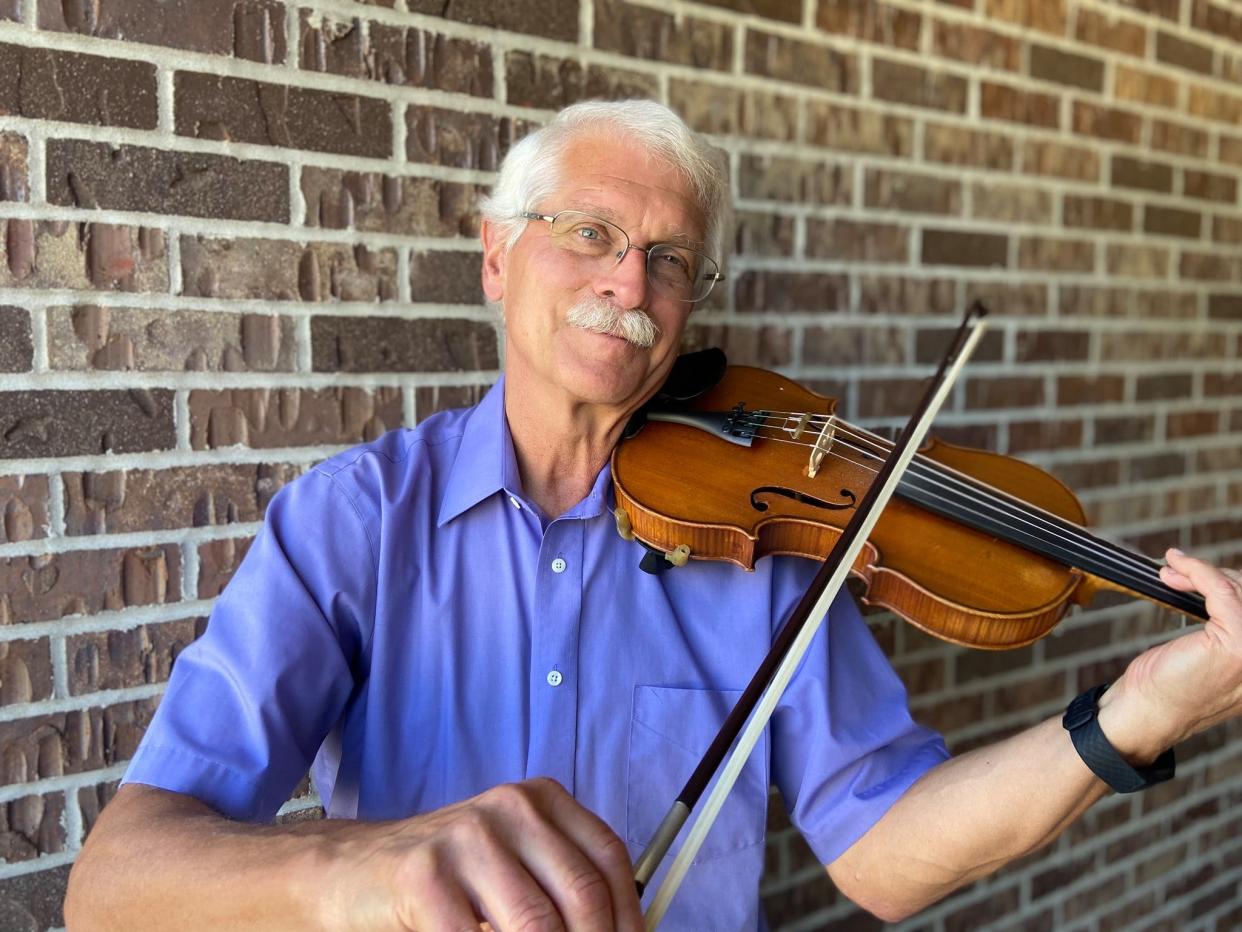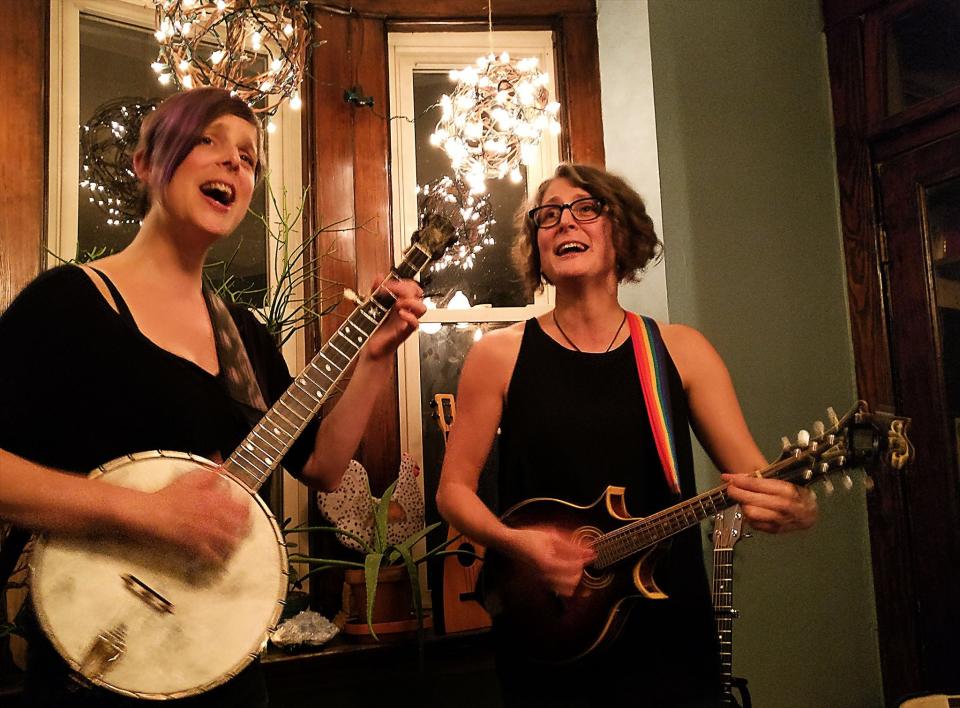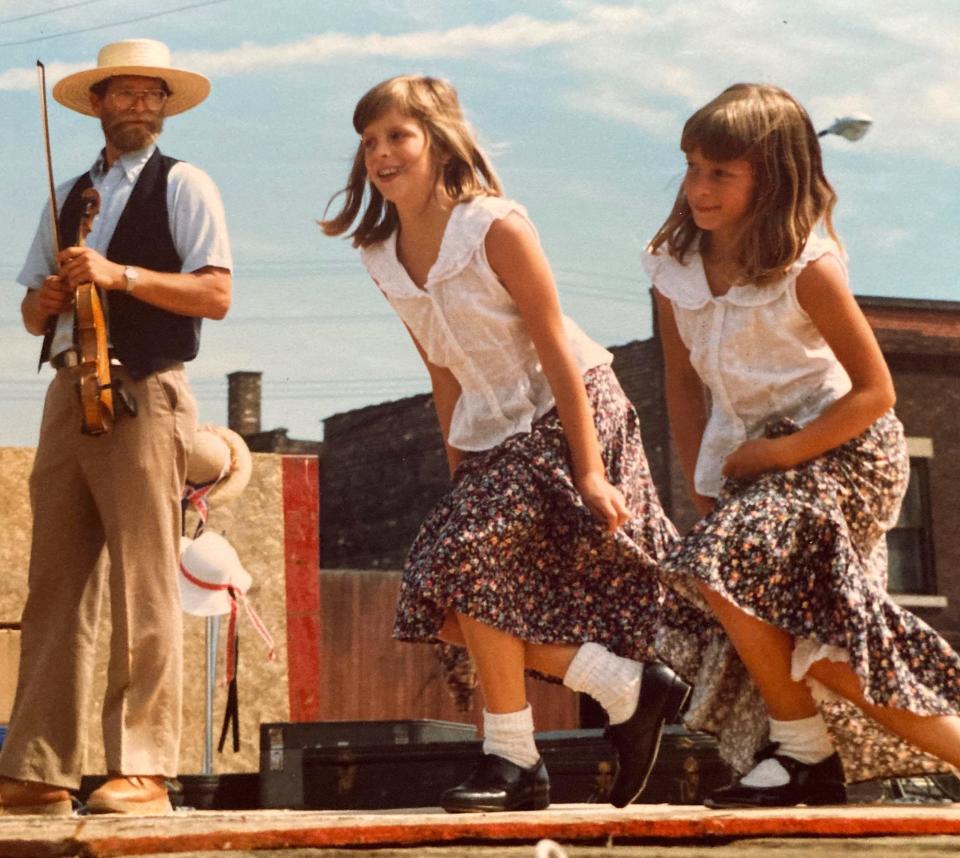How the late folk musician Paul Fotsch created community in Columbia and beyond

Growing up, Leela and Ellie Grace huddled by the radio each week to experience their father in a different dimension.
For about a dozen years, Paul Fotsch hosted the show "Woody's Children" on Columbia's community radio station, KOPN. He curated a program of songs, each pulled from the nearly fathomless pool of music he loved; and that weekly ritual still sounds in his now-grown daughters' ears.
"Here’s a variety of beautiful songs and styles that touched him in some way, and that we sat there and soaked in and thought about," Ellie Grace said, recalling what he delivered each week.
The show felt like a gift to his girls then. Today, it represents one portion of a generous inheritance; just one more way Fotsch shared himself with the world, one more way of letting others in on the joy of music.
Fotsch, who traveled Missouri and the United States as the folk musician Paul Grace, died in July at 74. Sunday, his family will honor him in the most fitting way: gathering those who loved and listened to Fotsch, first to live with their memories, then to make music together.
From Columbia to the whole country — and back
A St. Louis native, Fotsch came to the University of Missouri, graduating with a forestry degree in 1971.
"He joked that he went on to work with wood in the form of guitar, mandolin and fiddle," Ellie Grace said.
Moving through Columbia in the '70s, Fotsch sought — and created — community along multiple avenues. Serving his neighbors, he worked at community grocery stores, cafes and farms. He also lived within an ever-widening circle of local folk musicians, playing with his former wife, Win Horner; eventually, their daughters; and in outfits like The Discovery String Band with peers such as Cathy Barton, Dave Para and Bob Dyer.
"I don’t really feel like he set out to be a performer, that he just wanted to play and wanted to learn all these songs that he loved," Leela Grace Barr said.
For her dad, to play with and for other people felt like a happy dividend, she said.
Fotsch's sound lived in the space between intuition and dedication, his daughters testified. He could sit and play an instrument to the point of distraction, Leela Grace Barr said. And he also pulled off difficult musical gestures, such as singing and playing fiddle at once, with seeming effortlessness.
"It never seemed hard for him, but he was always working on getting better," she said.
Growing up around barbershop singing, Fotsch knew how to create a rich, almost buzzing tone in harmony with others, Para said. Singers like Fotsch "cradle the other person’s voice with theirs," he said.
On stage and off, Fotsch lived out the same genuine spirit — and gleefully groan-inducing sense of humor. He was a "font of terrible jokes," Leela Grace Barr said with clear affection, and enjoyed songs built around nimble wordplay and dizzy punchlines.
A very "alive" spirit marked the Columbia music scene at that time, Ellie Grace said. Her parents' generation worked to ensure their music belonged to everyone, she said. And seeing music as one bedrock element of a full, integrated life, they recreated systems of mutuality and community.
"They didn’t just do what was given to them," she added.
When the duo known as Paul and Win Grace took their music full-time in the mid-'80s, the Grace girls witnessed their parents take a sound developed in a specific community across North America. Their music pulled its weight, "honoring and legitimizing Missouri" across the country, Ellie Grace said.
The circle never felt unbroken for Fotsch and his peers — they exerted their greatest influence at home.
Columbia songwriter Violet Vonder Haar, who fronts the folk-rock band Violet and the Undercurrents and is a driving force behind Compass Music Center, grew up with front-row seats — sometimes even closer — to Fotsch and his folk-music peers.
Seeing the Grace family perform at the Big Muddy Folk Festival in Boonville spurred her desire to chase music. And among her sweetest musical memories, Vonder Haar cherishes singing "Blowin' in the Wind" with her sister alongside Paul and Win Grace at the end of a residency the duo performed at her school.
That generation of mid-Missouri musicians opened their song circles to kids like Vonder Haar, teaching her folk songs that still reverberate.
"Paul and his generation of musicians have left an indelible mark on the world of songwriting and folk music in mid-Missouri and beyond," Vonder Haar said in an email. "Their passion and talent created a warm and inclusive atmosphere that inspired countless others, including myself, to not only create music but also to honor our musical roots."
A family full of musical Grace

Becoming musicians, as both Grace girls did, was "inevitable," Ellie Grace said.
Not because her parents imposed any ambitions but because, to them, music was like breathing in and out. Her dad loved encouraging other people to breathe too.
"He wasn’t the kind of person who taught you, as in lectured you. He was the kind of person who taught you by showing you and by letting you find your own way," she said. "It was almost like I didn’t know he was teaching me."
The sisters perform as a duo and individually; Ellie lives near Kansas City, Leela in Portland, Oregon. Both see their father's gentle hand upon their music. Ellie Grace plays the same instruments her father did — guitar, mandolin and fiddle — though with very different styles, she said.
Leela Grace Barr first handled her chosen instrument, the banjo, at 13 — around the same age her dad picked up the guitar. And she shares the same ability to collapse time, losing herself while her fingers find new paths around strings, she said.
Both sisters said Fotsch loved them toward being themselves as musicians and as people.
"He offered this kind of acceptance that feels really rare, just letting people be how they are," Ellie Grace said. "... My sister and I both have been thinking a lot about it, and we can never think of a single time when we felt judged by our dad."
He extended that same acceptance to everyone he met, she added.
Looking back with laughter, Ellie Grace's two great teenage rebellions share in her father's compass values. She felt a little lawless listening to pop music, which her dad — with characteristically wide tastes — just came alongside her and enjoyed.
And rehearsing the kindness she saw him extend to all living things, she once hid her parents' flyswatter out of reach, aiming to avoid even the slightest harm.
Seeds land where they're sown, and the Grace sisters showed musical promise early. Leela Grace Barr remembers, around age 6, entreating her sister to sing something, anything, so she could practice harmonizing. On car trips, she often listened to duo singers between earphones, singing a third harmony part out loud.
"You have to sing the melody," she recalled her parents insisting.
Paul and Win Grace didn't want to fold their daughters into a family band for gimmick's sake, Para recalled. But watching the duo from just off stage, and watching their girls grow up, he saw the moment coming.
Leela and Ellie would come on stage at times to play percussion or dance, but not to sing. But they knew their parents' songs by heart, and Para recalls giving his friends a kind nudge to let the girls do what they were already capable of doing.

For her part, Leela Grace Barr remembers thinking "give me the microphone," she said. A kid who preferred spending time in nature, and reading and writing, she was shy everywhere but music.
Traveling, and eventually performing, alongside their parents also widened the sisters' circles of influence. The community her parents created through music only stoked their daughters' creativity.
"Ellie and I didn’t have a lot of friends our age because we weren’t in school, so we really connected with a lot of the musicians who we saw a couple times a year at different festivals," Leela Grace Barr said.
The pedagogy of Paul
Fotsch ended his full-time music career in 2006, traveling full circle to take a job at Woodhaven, helping care for people with disabilities in Columbia. He married his longtime partner, Barbara Keen, in 2019 and only kept furthering his love of music, nature and spiritual knowledge.
"He spent his last day on this earth sharing his contagious music and warm smile at the Columbia Farmer’s Market," the family's obituary notes.
Para heard his friend's physical voice change over the years, settling into its lower range; but Fotsch's presence never wavered. After Para's partner Cathy Barton died, Fotsch came alongside him to finish a summer worth of gigs they still had on the books. The counsel he lived out in that moment clearly still moves Para.
The eight albums Fotsch recorded and countless notes he sang and picked resound. As Ellie Grace said, he didn't engage in much formal teaching. Today, she and her sister — and others influenced by Fotsch's music — are essentially creating a pedagogy for the many lessons he handed down, she said.
Vonder Haar is among those students who are now teachers, Ellie Grace said. Through Compass, she has facilitated lessons and camps, created an intergenerational rock band and this fall plans to start a folk choir.
"Folk music is a precious legacy, and without its continuous creation and sharing, it risks fading away," Vonder Haar said.
Students of all ages who sit at Vonder Haar's feet "take the heart of what’s happening in Columbia and spread it" as her parents once did, Ellie Grace added.
Fotsch's daughters daily seek to teach and parent from the reservoir of folk and soul he left them. As an educator, Leela Grace Barr often draws on her dad's sense of humor, making a joke at her own expense or "cracking" herself up to disarm music students struggling with their confidence.
And as a mother, she wants to be "solid and loving and present," as her dad was, encouraging her kids to find their own way — just as she and Ellie did — and "not try to make them into me."
In this way, Fotsch's signature song just keeps being passed along.
A celebration of Fotsch's life will be held at 1:30 p.m. Sunday at Unity of Columbia, 1600 W. Broadway. And a time of song will follow at the Bonnie View Nature Sanctuary shelter at 3300 W. Rollins.
Aarik Danielsen is the features and culture editor for the Tribune. Contact him at adanielsen@columbiatribune.com or by calling 573-815-1731. He's on Twitter @aarikdanielsen.
This article originally appeared on Columbia Daily Tribune: Folk singer Paul Fotsch remembered for kind musical presence

